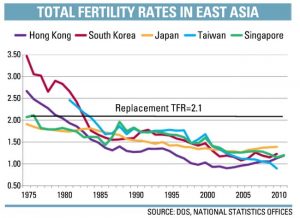In light of the upcoming class on the impact of Japan’s demographic challenges on its higher education sector, we found this article on how the Korean government has been dealing with similar problems of an ageing and shrinking population to be an interesting piece for discussion.
Article available at: http://thediplomat.com/2017/02/impeachment-scandals-overlooked-victim-koreas-higher-education/

Falling fertility rates, ageing populations and shrinking workforces are issues in many developed East Asian countries: https://vulcanpost.com/4278/something-bizarre-is-happening-east-asians-are-having-lesser-babies/
The birthrate in Korea has been falling over the last 30 years, resulting in an ever smaller cohort of students entering higher education institutions. The article discusses several strategies that the Korea government has implemented (expansion of student loan programs, reducing funding to universities that perform poorly in rankings) and recommends that Korea needs to “shift to a more globalized platform of education… for longevity”, for instance, through attracting more international students, once again highlighting the prevalence of the discourse and strategy of internationalization and globality in higher education. The author also points out several differences between the situation in Korea and Japan, reminding of us how there are no one-size fit-all solutions, that “best practices” have to be localized.
The main question we would like to pose is therefore:
- Should governments step in to support higher education institutions which are struggling financially? Or should these institutions be allowed to “fail” as per market logic because they are “inefficient”? What about other considerations e.g. if the university is the only one serving a certain geographic location?
Several other interesting questions that arose after reading the article:
- What are your opinions on government student loans? Is higher education a socially desirable public good and hence should, or to what extent, should the government subsidize higher education fees? Should higher education be free?
- Universities often try to attract international students for various reasons, including to increase the university’s revenue. The article points out however, that countries where English is not the main mode of instruction face challenges in attracting English-speaking students. Should non-English speaking universities hence attempt to switch to English as the medium of English for all/certain courses because it is the (economically) “pragmatic” thing to do, or is that objectionable e.g. erosion of culture etc.?